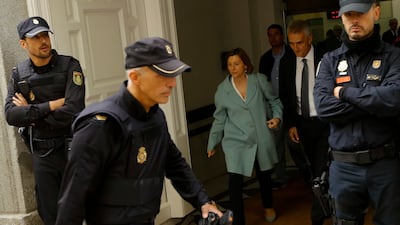Spanish courts are likely to issue a European arrest warrant for former Catalan president Carles Puigdemont after he failed to appear at a Spanish court hearing on Thursday, Spain's top judge said.
Mr Puigdemont's lawyer in Belgium, where he has travelled with four members of his sacked cabinet, said the climate in Spain was "not good" and his client wanted to take "some distance"; but he would co-operate with the courts.
"If they ask, he will co-operate with Spanish and Belgian justice," said lawyer Paul Bekaert.
Spain's prime minister Mariano Rajoy sacked Mr Puigdemont and his government on Friday, hours after the Catalan parliament made a unilateral declaration of independence — a vote that was boycotted by the opposition and declared illegal by the Spanish courts.
Mr Puigdemont said on Wednesday he would ignore a court order to return to Spain to answer charges of rebellion, sedition and misuse of public funds relating to the region's secessionist push. He did not turn up at a High Court hearing on Thursday.
"When someone doesn't appear after being cited by a judge to testify, in Spain or any other EU country, normally an arrest warrant is issued," said Supreme Court President Carlos Lesmes who is also the head of the General Council of the Judiciary, Spain's top judicial body.
An arrest warrant would make it virtually impossible for Mr Puigdemont to stand in a snap election in Catalonia called by the Spanish government for December 21. The decision will be taken by a High Court judge following the testimony of the remaining nine members of Mr Puigdemont's sacked cabinet, including former vice-president Oriol Junqueras.
Five senior regional parliamentarians and the speaker of the Catalan parliament, Carme Forcadell, were also summoned by the Supreme Court, which handles the cases of people who enjoy parliamentary immunity.
The first person to be questioned was Jordi Turull, the regional government's former spokesman. "You are not alone," a group of around 30 people, mostly Catalan politicians, chanted as he and former regional ministers arrived at the National Court in another day of high drama in the worst crisis to hit Spain, a country of 47.5 million people, in decades.
CATALONIA DIVIDED
The Supreme Court agreed on Thursday to give one more week to Ms Forcadell and the Catalan politicians to prepare their defence and a new hearing will take place on November 9..
By 1015 GMT, five members of the dismissed Catalan cabinet had already testified before the High Court judge who is due to decide at this first hearing whether she starts a comprehensive investigation that could take several years and potentially lead to a trial.
She will also determine whether those called to testify should go to jail pending the investigation. She might also grant them conditional bail or order them to surrender their passports.
The courts have already told the Catalan secessionist leaders to deposit 6.2 million euros (Dh26.5 million) by Friday to cover potential liabilities. On Tuesday, Mr Puigdemont said he would go back to Spain only if given unspecified "guarantees" by the Spanish government.
Following a tumultuous month, attention is gradually turning to the December vote.
But also outside the court were about a dozen opponents of Catalan separatism, brandishing the red and yellow flags of Spain.
Cracks have appeared within the pro-independence coalition of centre-right and far-left parties as well as inside Mr Puigdemont's own PdeCat (Democratic Catalan Party) where some of his allies are now pushing for a negotiated solution with the central government. The struggle has also divided Catalonia itself and caused deep resentment across the rest of Spain, although separatist sentiment persists in the Basque Country and some other areas.
Two recent opinion polls showed support for independence may have started to wane. But an official regional survey published on Tuesday showed some 48.7 per cent of the 7.5 million Catalans believe the region should be independent, up from 41.1 per cent in June and the highest since December 2014.
On Monday, Spain's chief prosecutor said he was seeking charges of rebellion — punishable by up to 30 years behind bars — sedition and misuse of public funds against Mr Puigdemont and 13 associates.
"This shouldn't be happening, the conflict between Catalonia and the Spanish state won't be resolved through courts and violence," said former Catalan president Artur Mas, who had travelled to Madrid to show support.
"The more gasoline and wood you add to the fire, the bigger it becomes."
Mr Puigdemont, 54, has dismissed the accusations as politically motivated and on Tuesday said he would remain in Brussels until he had guarantees that any proceedings would be impartial.
In a statement, he said part of his government would go to the National Court "to denounce the drive of Spanish justice to pursue political ideas," while others, including himself, "will stay in Brussels to decry this political process to the international community."

